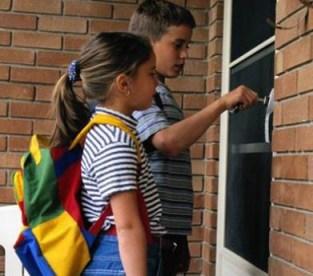
Image from examiner.com
The U.S. Bureau of Labor Statistics reports that the number of families with children where both parents worked is 59.0 percent. That means these families likely have latchkey kids, or those who come home from school to a house without parents. With the addition of a DIY Home Alarm and some strategic planning, your family will feel more prepared, especially with school in full swing and the kids are at home alone more often.
Before School
Moises Ramon of UCLA Early Care and Education says it’s important to have a set schedule of events and tasks in the morning and evening for latchkey kids. Children feel better knowing what’s coming next. Sit down with your children and make a list. Decide together what needs to be done each and every morning, in order of importance. Make a list and put it on the fridge. Teach your kids how to use the alarm feature on their cell phones to set reminders. Eventually the tasks will become second nature and the alarms won’t be necessary. The morning list might look something like this:
· Get dressed (clothes will be laid out the night before).
· Eat breakfast (planned with your help in advance).
· Clean up breakfast dishes (chores are good for the soul).
· Take your pill ( If your child take vitamins or medicine. Obviously not applicable to everyone).
· Lunch (again, help from you in advance to assure nutritional value).
· Double check backpack, make sure homework and lunch is packed.
· Leave house at agreed upon time: not before and not after. Set your own reminder to call your child at this time to make sure they are on track.
· Lock door behind you, place key in assigned pocket in backpack.
After School
Some schools offer before and after-school care, usually for elementary school-age children. Take advantage of these programs. They are structured and supervised. Some even offer a smart breakfast in the morning session and a snack in the afternoons along with homework help or supervised adult-led activities. As stated by the MetLife Foundation After School Alliance, this can be an enriching and nurturing addition to your child’s day.
After-school time for older kids is more of a challenge, as there are fewer school-sponsored programs offered. One option is scholastic-based study programs but these are rarely free of charge. Another option if you are affiliated with a church is to see what they have to offer after school. Volunteering whether faith-based or not is a great way to spend afternoons— it’s win-win, too. Your child learns the importance of charity work and the venue gets a helping hand while supervising. If there is no option but to go home alone after school, make a second list. It might look something like this:
· Go straight home. The only exception is a pre-arrangement between you and another parent in advance.
· After unlocking the door, place the key back in its assigned backpack pocket.
· Lock the door behind you. No friends or visitors until parents are home.
· Get a snack and begin homework. No TV, computer or games until homework is done.
· Lay out clothes for next day (This counts as a chore).
You want to give them enough to do to keep them occupied, not wear them out as they have already had a full day at school. If homework is finished before you get home, there is an opportunity for some free time like TV or computer time. Have rules in place about being safe online, no talking to strangers and no gossiping or bullying. Have this talk ahead of time. If you need help starting this discussion, there is an award-winning organization online called Enough is Enough that can lend guidance on this very important topic.
Lastly, make time in your day to check in with your child. This does not mean helicoptering and calling every 30 minutes. Give your child age-appropriate responsibilities and show them you have faith in them to follow through. This is good for you both. It builds their self-esteem while strengthening the partnership between you. As they grow older you will be glad you instilled that sense of independence, as hard as it may be to let them go. You’ll both benefit from the experience if you handle it with love, patience and mutual trust.

